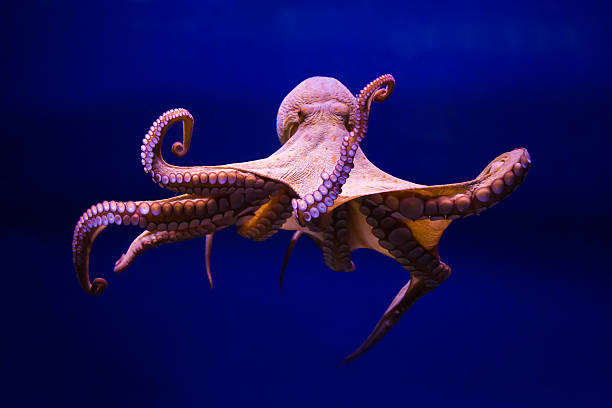The Hidden Intelligence of Cephalopods
In the vast blue depths of our oceans, a remarkable intelligence has evolved entirely separate from our terrestrial brain development. Cephalopods—octopuses, squids, and cuttlefish—represent one of nature's most fascinating cognitive experiments. These invertebrates display problem-solving abilities, emotional complexity, and learning capabilities that challenge our understanding of intelligence. Unlike mammals whose intelligence evolved through social interaction and communal living, cephalopods developed their remarkable brains largely as solitary hunters, creating a truly alien form of cognition that continues to astonish researchers worldwide. Their unique neural architecture and remarkable abilities provide a window into alternative evolutionary paths to intelligence.

The Remarkable Brain Architecture
Cephalopods possess a nervous system unlike any other animal on Earth. While a human brain is centralized, an octopus has a distributed neural network with approximately 500 million neurons—comparable to a dog—but organized completely differently. Only about one-third of these neurons reside in the central brain; the remainder spread throughout the arms, allowing each limb to function with remarkable independence. This decentralized design means octopus arms can solve problems even when separated from direct brain control.
Research conducted at the Marine Biological Laboratory in Woods Hole, Massachusetts revealed that severed octopus arms continue responding to stimuli for up to an hour, avoiding noxious objects and reaching toward food. This unique neural arrangement grants cephalopods unparalleled body control, enabling the mimic octopus to transform into convincing replicas of other sea creatures and allowing cuttlefish to change their skin patterns in milliseconds—faster than neural signals from a centralized brain could travel.
The cephalopod brain also evolved specialized regions for learning and memory despite lacking a hippocampus (the memory center in vertebrate brains). Instead, they developed vertical lobes that serve similar functions through convergent evolution—arriving at similar solutions through entirely different pathways. This presents valuable insights for neuroscientists studying alternative forms of intelligence.
Problem-Solving Prodigies
Cephalopod intelligence manifests most impressively in their extraordinary problem-solving abilities. Octopuses routinely demonstrate cognitive skills once thought exclusive to vertebrates. In laboratories worldwide, these eight-armed marvels unscrew jar lids, navigate mazes, use tools, and even recognize individual human faces—despite having evolved separate from mammals for over 500 million years.
New Zealand researchers documented octopuses collecting coconut shell halves from the ocean floor, carrying them awkwardly across exposed terrain, and later assembling them into protective shelters—clear evidence of tool use and future planning. In aquariums, octopuses have become notorious for their escape artistry, squeezing through impossibly small openings, dismantling equipment, and even making brief journeys between tanks to hunt preferred prey before returning to their homes.
Perhaps most remarkably, these animals demonstrate play behavior—manipulating objects with no apparent purpose beyond entertainment—a behavior long considered a hallmark of advanced cognition. Researchers at the Seattle Aquarium observed octopuses repeatedly releasing plastic toys into circulating currents, catching them, and releasing them again in what appeared to be purely recreational activity.
The Emotional Lives of Tentacled Beings
While scientists once dismissed the possibility of emotional complexity in invertebrates, evidence increasingly suggests cephalopods experience rich emotional states. These creatures display clear preferences for certain individuals—both among their own kind and humans—and can hold grudges against those who mistreat them.
Aquarium staff worldwide report octopuses selectively interacting with certain keepers while actively avoiding others who previously handled them roughly. Some individuals develop apparent bonds with particular staff members, changing color upon their approach and extending arms for gentle interaction. Conversely, they may squirt jets of water at disliked humans or refuse food from certain individuals.
Studies of hormone profiles in octopuses reveal fluctuations corresponding to environmental stress, social interactions, and reproductive states—similar to vertebrate emotional responses. While their emotions likely differ significantly from human experiences, growing evidence suggests cephalopods possess an emotional repertoire that influences decision-making, learning, and social behavior.
This emotional capacity raises important ethical questions about how these animals are treated in research, aquaculture, and entertainment settings. Several countries, including the United Kingdom, have already extended special protection to cephalopods under animal welfare legislation, recognizing their unique sensitivity and potential for suffering.
Masters of Deception and Camouflage
Perhaps no ability better demonstrates cephalopod intelligence than their mastery of deception and camouflage. These animals possess specialized skin cells called chromatophores, iridophores, and leucophores that enable them to match colors, patterns, and even textures of their surroundings with astonishing precision. This capability requires sophisticated integration of visual information, environmental assessment, and neural control.
The mimic octopus (Thaumoctopus mimicus) elevates this skill to an art form, impersonating over fifteen different marine species including sea snakes, lionfish, flatfish, and mantis shrimp. This strategic mimicry demonstrates not only pattern-matching ability but advanced cognitive assessment of which dangerous animal would most effectively deter a specific predator—a form of situational problem-solving requiring substantial intelligence.
Cuttlefish deploy their camouflage abilities in even more sophisticated ways. Males often display different patterns on opposite sides of their bodies—showing courtship displays to females on one side while maintaining predator-deterrent patterns on the side facing potential threats. This split-personality display requires complex neural control and demonstrates multitasking abilities previously thought impossible in invertebrates.
Research into these camouflage mechanisms has inspired advances in military technology, adaptable materials science, and even potential medical applications for color-changing diagnostic tools. The current market for biomimetic technologies inspired by cephalopod camouflage exceeds $500 million annually, with projected growth as researchers develop more sophisticated applications.
Conservation Challenges and Future Research
Despite their remarkable intelligence, cephalopod populations face significant threats from overfishing, habitat destruction, and climate change. Annual global squid harvests exceed 3.6 million tons, while octopus fishing has increased by approximately 6% annually over the past decade. Ocean acidification particularly threatens these animals as their calcium carbonate structures become vulnerable to dissolving in increasingly acidic waters.
Conservation efforts remain complicated by cephalopods’ generally short lifespans—most octopus species live only 1-2 years—making traditional conservation strategies less effective. However, their remarkable adaptability may provide some resilience in changing oceanic conditions. Studies indicate certain cephalopod populations have actually increased in warming waters, potentially benefiting from declining fish populations and their own shorter generation times that allow faster evolutionary adaptation.
Future research directions include deeper investigation of cephalopod consciousness, potential for interspecies communication, and applications of their unique neural architecture to artificial intelligence development. Several research institutions have established dedicated cephalopod cognition laboratories, including facilities at the Marine Biological Laboratory, the University of Chicago, and the Okinawa Institute of Science and Technology.
As we continue deciphering the mysterious minds of these tentacled intelligences, we gain not only scientific knowledge but also philosophical insights into the nature of consciousness itself. Cephalopods remind us that intelligence can evolve through radically different pathways and that the capacity for complex cognition may be more widespread throughout the animal kingdom than previously imagined—challenging our human-centric view of mental capabilities and perhaps broadening our understanding of what it means to think.





